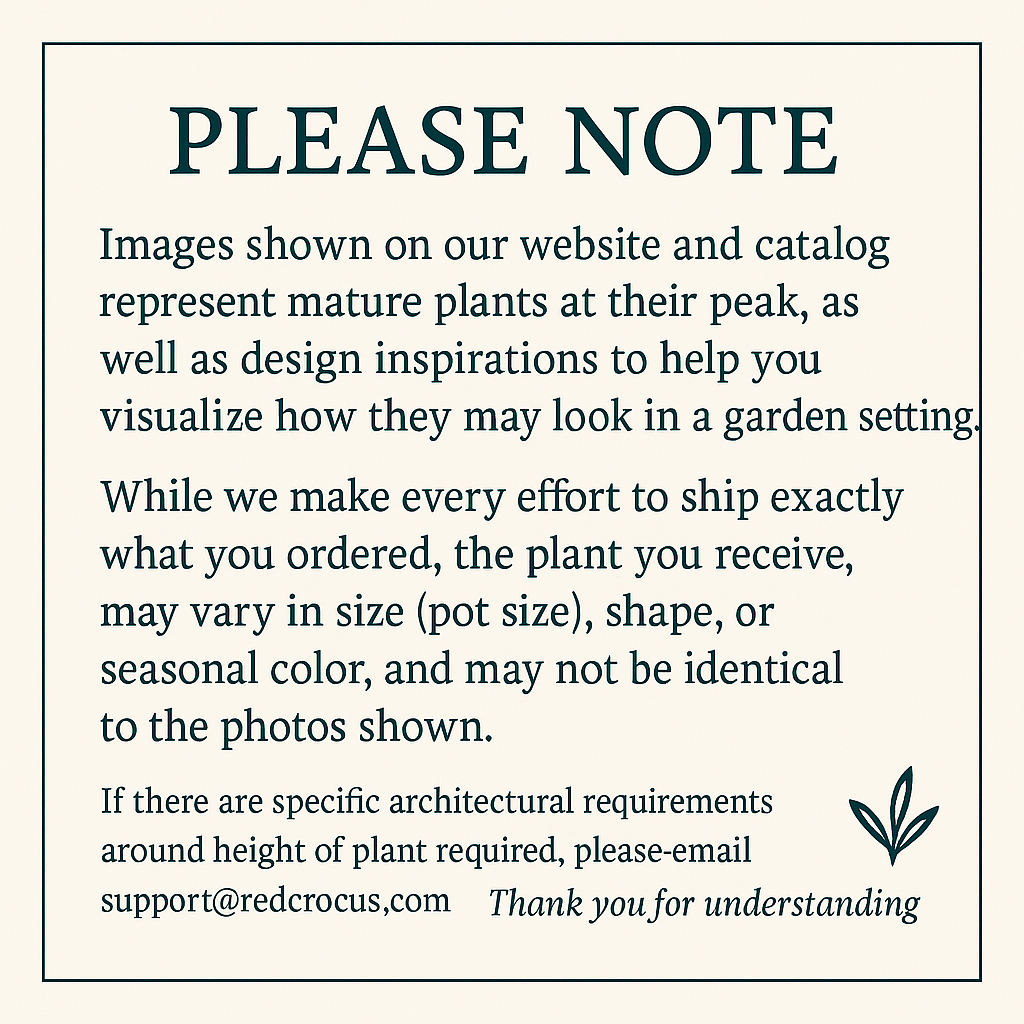1
/
of
21
Bald Cypress–Taxodium distichum–Deciduous conifer for wet conditions 2-2.5" cal B&B
Bald Cypress–Taxodium distichum–Deciduous conifer for wet conditions 2-2.5" cal B&B
Regular price
$1,152.00 USD
Regular price
$1,497.60 USD
Sale price
$1,152.00 USD
Unit price
/
per
Shipping calculated at checkout.
SKU:nto2407-redcrocus
Couldn't load pickup availability
Taxodium distichum
Description
The Bald Cypress is a deciduous conifer known for its majestic, pyramidal shape and unique ability to thrive in wet conditions. It features feathery, needle-like leaves that turn a beautiful russet color in the fall before shedding for the winter. This tree is often found in swampy areas and is notable for its "knees," which are woody projections that emerge from the roots.
Suggested Uses
Ideal for large landscapes, parks, and as a specimen tree in areas with ample space. It is also suitable for planting near water bodies due to its tolerance of wet conditions.
Plant Details
-
 Botanical Name: Taxodium distichum
Botanical Name: Taxodium distichum -
 Common Name: Bald Cypress
Common Name: Bald Cypress -
 Size & Growth: Typically 50-70 feet tall, can reach up to 100 feet
Size & Growth: Typically 50-70 feet tall, can reach up to 100 feet -
 Hardiness Zones: 4-9
Hardiness Zones: 4-9 -
 Foliage Type: Deciduous
Foliage Type: Deciduous -
 Bloom Time: Spring
Bloom Time: Spring -
 Growth Rate: Moderate to fast
Growth Rate: Moderate to fast -
 Light Requirements: Full sun to partial shade
Light Requirements: Full sun to partial shade -
 Attracts Pollinators: No
Attracts Pollinators: No -
 Indoor Friendly: No
Indoor Friendly: No -
 Container Friendly: No
Container Friendly: No -
 Deer Resistant: Yes
Deer Resistant: Yes -
 Pet Warning: Non-toxic
Pet Warning: Non-toxic -
 Fragrant: No
Fragrant: No -
 Cut Flower: No
Cut Flower: No -
 Grows Well With: Water-loving plants like willows and swamp hibiscus
Grows Well With: Water-loving plants like willows and swamp hibiscus
Care Tips
-
 Planting Instructions: Plant in spring or fall in a location with ample space
Planting Instructions: Plant in spring or fall in a location with ample space -
 Soil Moisture: Prefers moist to wet soil
Soil Moisture: Prefers moist to wet soil -
 Soil Type: Tolerates a range of soil types, including clay and sandy soils
Soil Type: Tolerates a range of soil types, including clay and sandy soils -
 Humidity: Thrives in high humidity
Humidity: Thrives in high humidity -
 Pruning Instructions: Minimal pruning required, remove dead or damaged branches
Pruning Instructions: Minimal pruning required, remove dead or damaged branches -
 Winter Care: Mulch around the base to protect roots in colder zones
Winter Care: Mulch around the base to protect roots in colder zones -
 Planting Depth: Ensure root ball is level with the soil surface
Planting Depth: Ensure root ball is level with the soil surface -
 Fertilization: Apply a balanced fertilizer in early spring if needed
Fertilization: Apply a balanced fertilizer in early spring if needed -
 Special Care: Monitor water levels in dry periods, especially for young trees
Special Care: Monitor water levels in dry periods, especially for young trees
Share










































